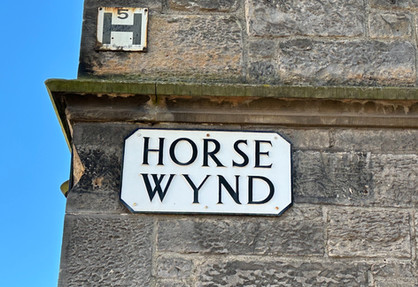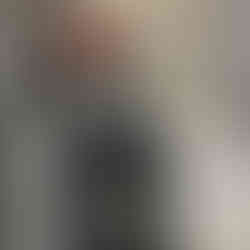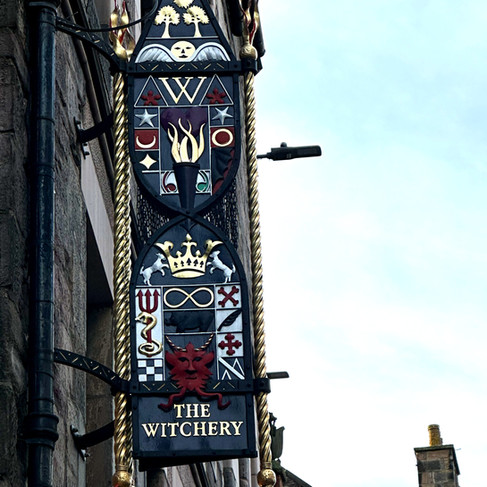Three Days in Lovely Edinburgh, Scotland
- ellen
- Mar 3, 2024
- 10 min read
Updated: Apr 27, 2025

Three days is a perfect amount of time to discover Edinburgh. With a population of only about half a million, it's a walkable, manageable city. People are friendly and as a solo visitor, I felt safe both day and night. I spent one day in Old Town, one in New Town and the last day at Edinburgh Castle and Holyrood Palace. With a full three days, you could also use one of them to discover the countryside.
Old Town

The Royal Mile cuts Old Town in half and runs from Edinburgh Castle eastward to Holyrood Palace. Part of it as shown above is pedestrian only. The medieval architecture that dominates Old Town gives Edinburgh its old-world charm.


Victoria Street
Victoria Street, the charming, winding cobblestone street named after Queen Victoria, is one of the most iconic areas of Old Town. It's packed with cafés and shops with colorful fronts. I especially loved it at night as evidenced by the cover photo above, but it maintains its charm by day.




This pub on Victoria Street is adults only; this sign says no children welcome (however dogs are)!
Grassmarket

The southern end of Victoria Street empties into Grassmarket, a pedestrian swath of land in the heart of Old Town with a colorful history. It was originally formed in 1477 under the reign of King James III as a market and trading post for cattle and other livestock. In the latter half of the 17th century it became known for public executions. Hangings took place on a daily basis for over 100 years, until 1748. Now it's lined with cafes and pubs.

I had lunch at The Last Drop, a cozy pub whose name refers to the last drink that prisoners had prior to their execution. Notice the nooses in the windows.

I had Cullen skink, a delicious and hearty smoked haddock chowder.
Cockburn Street

Less colorful than Victoria Street, but no less charming, is Cockburn Street, named after Lord Henry Thomas Cockburn, a Scottish lawyer, judge and literary figure who lived in the early 19th century. Cockburn Street connects the Royal Mile to Waverly Station, Edinburgh's train station to the north.

Stop at the Milkman, a hole-in-the-wall bakery with great coffee and pastries. It's at the south end of the street, just off the Royal Mile.

This restaurant just a few steps from the Milkman was promoting its Haggis. I never got up the nerve...

Greyfriars Kirkyard

At the southern edge of Old Town is the Greyfriars Kirk and kirkyard. The name comes from the Franciscan friars who cared for the church and grounds and who wore gray robes. It's said to be haunted, but I found it a lovely and peaceful place to walk around on a beautiful winter day.
Greyfriars Bobby

The most notable burial at Greyfriars is a Skye Terrier named Bobby. In the mid 19th century, John Gray took a job as a night watchman with the Edinburgh police department. He was soon accompanied on his rounds by the young Bobby. John and Bobby were inseparable until John's death in 1858. Bobby was heartbroken to have lost his best friend and spent every day at John's grave in Greyfriars Kirkyard. After unsuccessful attempts to evict Bobby, the cemetery's gardener took pity on him and eventually erected raised stone slabs next to John's grave to protect him from the elements.
When Bobby finally died, 14 years after his master, the Edinburgh elders made an exception and buried him in the kirkyard where he is immortalized.

Just down the street from Greyfriars Kirk is a tavern of the same name with a statue of Bobby in front. It's said that rubbing his nose will bring good luck.

St. Giles Cathedral

Founded in 1124 as a Roman Catholic church, St. Giles' has a rich 900 year history. It remained Catholic until the 16th century when it adopted Protestantism and served as John Knox's parish church until his death in 1572. It is now the Presbyterian cathedral of Scotland. Queen Elizabeth received the Honours of Scotland there in 1953 and her body laid in state there after her death in September, 2022.

The Midlothian heart is a mosaic that graces the sidewalk in front of St. Giles'.

It marks the spot of the entrance to the Old Tolbooth, originally constructed in the 14th century. It was used for various purposes including holding meetings of the Scottish Parliament. It became a jail and in the latter part of the 18th century public executions were held there. Below is an engraving as it would have appeared in the 18th century.

On my last day as I was walking up the Royal Mile from Holyrood Palace, I noticed an interesting building pictured below. I was intrigued by the name having seen the location of another tolbooth at St. Giles' and decided to have lunch there. I asked the manager about the history. He said that it originally served as a gateway to the city at the Flodden Wall during the 16th century. He told me that the pub has "only been in existence a little over 200 years"! I loved having lunch in such an old, historic building.

The Closes

These fascinated me. "Close" is thought to stem from the Scot's term for alleyway. They originated in medieval times, many of them radiating from the Royal Mile. They often led to a courtyard and were gated and locked at night so only those with keys could enter, creating one of the oldest gated communities of the world! There are scores of them in Edinburgh's Old Town. Here are a few.
The National Museum of Scotland

I learned that all museums in Scotland are free to visit; what a bargain! Located at the southern edge of Old Town, the National Museum is definitely worth a visit. It's huge, so plan accordingly. I was there at the end of the day and only spent an hour or two; you could happily lose yourself if you had more time. If you want traditional artwork, this is not the place. Instead, its galleries include fashion, photography, science and technology, history and prehistoric and other large animals. There's really something for everyone.

To top it off, it has a seven-story wing that celebrates the history of Scotland from prehistoric times to the present and the pièce de résistance is a roof terrace with beautiful views of Edinburgh.
New Town

As the name suggests, New Town was established in the the 17th and 18th centuries, well after Old Town was populated in the Middle Ages. Old Town was a walled city and it was bursting at the seams, so the city fathers wanted an area where the more wealthy citizens could live. Not surprisingly, it has a very different vibe from Old Town, but it's definitely worth time if you can fit it in.
Princess Street which is largely commercial, divides Old Town from New Town.

From Old Town I walked north toward Princess Street, past this imposing view of the Castle.

I soon came upon St. Cuthbert's churchyard.
Stockbridge Market

This small outdoor market is a gem. Open on Sundays from 10:00 - 4:00, it sells everything from fresh produce to paella to arts and crafts to mulled wine. It was jam packed at midday when I was there.
Although I didn't taste any of the food, I did try the mulled wine. It was delicious, especially on a crisp winter day!
Circus Lane

Just a few steps from the Stockbridge market is Circus Lane. This short, cobblestone, winding lane is as charming as it gets and is a must-see if you venture into New Town.

It was so pretty in January; I can imagine how it might look in the summer!
I sat on this bench for a while just to enjoy the calm.

While you're there, take a look at the picturesque house at the corner of India Place and North West Circus Place.

Dean Village
As picturesque and interesting as Circus Lane and the market were, the highlight of my day in New Town was Dean Village.

Set on the Water of Leith, this compact, upscale village-within-a-city is a must-see on your itinerary. I was fortunate to be there on a crystal clear day which made it all the more beautiful.



When you're there, take a walk up to Dean Cemetery.
The Sir Walter Scott monument on Princess Street can be easily seen from all over Edinburgh. It's one of the largest monument to a writer in the world, second only to the José Martí monument in Havana, Cuba.
Miscellaneous photos from my wanderings through New Town.
One of the things that gives Edinburgh its charm are the street names. Here are a few.
Edinburgh Castle

Perched high upon an extinct volcano at the west end of the Royal Mile, Edinburgh Castle stands guard above the city as it has for 11 centuries. Throughout the centuries it has served as an arsenal, a treasury, a royal residence, a national archive, a mint and a prison, and today it houses the Honours of Scotland, or the Scottish crown jewels.
The views of the city and the North Sea from the castle are beautiful.
The impressive main gate.
The Portcullis gate, leading into the castle buildings and grounds.

St. Margaret's Chapel is the oldest building on the castle grounds and is the oldest in all of Edinburgh. It was built in the early 12th century by King David as a tribute to his mother, Saint Margaret of Scotland who died in the castle in 1093.

It's tiny, but still used today for weddings. Notice the beautiful carving on the archway.

This stained glass window on the right depicts Margaret.
The view from inside the chapel including Mons Meg. Made of wrought iron in the city of Mons, now in Belgium, this Medieval gun was given to King James II in 1457 by Philip the Good, Duke of Burgundy. It was cutting edge technology in its day.
The room in the castle holding the Scottish crown jewels is impressive, although no photos are allowed. They consist of the crown, the sceptre and the sword.
Below is the recreation of the rediscovery of the Honours which were lost for over 100 years.

I'm not a huge castle fan but I learned a lot and really enjoyed my visit. It's open to the public every day with a pre-purchased timed ticket. I would encourage the use of the audio guide which can be purchased for a small fee. If you're there during the peak tourist season, be sure to buy your ticket well in advance because they often sell out.
Holyrood Palace

Exactly one mile from the castle at the eastern end of the Royal Mile is Holyrood Palace. Officially known as the Palace of Holyroodhouse, the palace has served as the official residence of the royal family in Scotland since the 16th century.

Today the king spends at least a week a year at Holyrood and the royal family occupies it from time to time. As a working palace, no photos are allowed inside. At 87,000 sq. ft. and 289 rooms, it's considered small and intimate compared to other palaces owned by the royal family. Seventeen rooms are open to the public and the audio guide is very informative.
Adjacent to the palace are the ruins of Holyrood Abbey, founded in the first half of the 12th century. Eventually it served as a guesthouse and royal residence, then a parish church until the 17th century. It's been in ruins since the 18th century. Based on what remains, it must have been quite a church in its day. "Holyrood" is Scottish for "Holy Cross"'.

If you visit, be sure to save time to walk around the gardens. It was so green that the lack of leaves on the trees was the only clue that I was there in January.
Restaurants
I'm not sure what I was expecting, but the food in Edinburgh was excellent; I didn't have a bad meal. In addition to The Last Drop and the Tolbooth Tavern, I really enjoyed these restaurants.
Mussel & Steak

I discovered Mussel and Steak through a referral. Located at bottom of Victoria Street at the eastern end of Grassmarket, this restaurant is known for both its seafood and steaks. I had grilled prawns which were excellent. It's more expensive than the other restaurants I tried, but worth the extra pounds.
The Auld Hundred
I stumbled upon The Auld Hundred as I was walking back to Old Town from New Town. It's on a pedestrian side street just north of Princess Street. I liked the pub atmosphere and decided to give it a try for lunch. The first floor is a bar and some tables for food and the second floor is the restaurant. I had two starters; Welsh rarebit and smoked salmon, both of which I enjoyed.
Petit Paris
Francophile that I am, this tiny hole-in-the-wall restaurant on Grassmarket caught my eye early on and I tried it on my last night. If you're in the mood for some authentic French food and atmosphere, Petit Paris is the place. From the checkered tablecloths to the native French-speaking staff, you'll feel like you're in Paris. I had coq au vin which was delicious.
The Painted Rooster
I love trying different cafés for breakfast. The Painted Rooster was another referral, located in the West End just northwest of the Castle. It's tucked away down a flight of stairs, but the atmosphere is welcoming and the service excellent. They're also open for lunch and I'm sure it would be as good as my breakfast was.
Southern Cross Cafe
Located on upper Cockburn Street across from The Milkman, I was drawn to this little gem by the beautiful pastries in the window. I ate here twice; the first time for a mid-afternoon snack of chocolate cake and the second time for breakfast. The cake was incredible and they make the best latte that I had in Edinburgh. Definitely worth a stop when you're strolling in Old Town!
Hotel du Vin and Bistro

This small, boutique hotel is located at the southern end of Old Town, just steps from the National Museum of Scotland and Greyfriars kirk. It has a restaurant which I didn't try, but I did have a glass of wine and mussels a couple of nights in its cozy bar area. I've had mussels in France and Belgium and I can honestly say these were the best I've ever had!
All the rooms are located around a central courtyard and instead of a number, each has a name. I found this rather cumbersome because someone has to escort you to your room when you check in which can cause delays if there's a line. But that was a minor issue. Overall, it was a lovely hotel and my room was large and comfortable.
I thoroughly enjoyed my three days in Edinburgh. There's so much history and more than enough to discover in that amount of time. The people are gracious and friendly and they made me feel welcomed. Now I want to return to experience the rest of Scotland!
Here are a few parting photos from this lovely city.
➜ Top Tips
I recommend staying in Old Town due to its charm and proximity to many of the sights you'll want to see.
Edinburgh is a very walkable city; wear comfortable shoes!
Scottish weather can be changeable; I was lucky to have blue skies, but take an umbrella just in case.








































































































































































































































